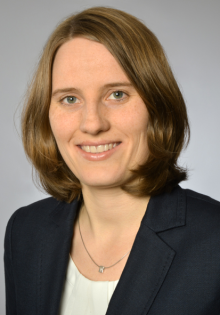Preeti V. Shah, Consul General at the US Consulate in Düsseldorf, was given an exclusive insight into quantum research at Paderborn University on Thursday, 22 May. A delegation led by physicist Prof Dr Christine Silberhorn and President Prof Dr Matthias Bauer not only gave an impressive presentation on current research priorities in the field of photonics, but also gave a tour of the new Photonic Quantum Systems Laboratory, or PhoQS Lab for short. At the end of last year, Paderborn scientists succeeded in building Europe's largest "Gaussian boson sampling"-based quantum computer. "PaQS" ("Paderborn Quantum Sampler") is the result of a project funded with around 50 million euros that brings together the expertise of 13 partners from science and industry. The aim is to promote Germany to the international forefront of photonic quantum computing.
Shah, who accepted the university's renewed invitation during her inaugural visit in March, was impressed by Paderborn's innovative spirit: "As a living space in which new dimensions of thinking and tomorrow's technologies are created, research at Paderborn University can be experienced. Curiosity and creativity come together here." The ambassador has been in the diplomatic service of the United States of America since 2004 and has held the office of Consul General since August last year. In conversation, the participants emphasised the importance of transatlantic friendship, which is more important today than ever before. The university has long-standing relationships with several universities and scientific institutions in the USA.
Clean thing: clean room for highly sensitive research
Research into the smallest energy particles - known as quanta - is bringing possibilities within reach that long seemed unthinkable. New concepts are expected to provide solutions for major challenges: for complex interrelationships in the field of resource efficiency, better traffic flows thanks to real-time data or tap-proof communication using quantum encryption. The PhoQS Lab has now created an even better framework for this. Scientists with different areas of expertise work together under one roof to advance international quantum research and bring basic research into application. The central element is the approximately 1,000 square metre clean room area, which the scientists were granted exclusive access to. Prof Silberhorn explains: "Here, state-of-the-art technologies ensure an extremely clean environment with precise control of temperature, humidity and absence of particles - essential for highly sensitive research."
A location with appeal
The PhoQS Lab and the research at Paderborn University will also strengthen NRW as a location. The project has already received the top rating of "outstanding" from the German Council of Science and Humanities, which makes recommendations for research policy. On this basis, it was approved in May 2020 by the Joint Science Conference (GWK), in which the science and finance ministries of the federal and state governments work together. Its decision is proof of the future supra-regional importance of the PhoQS Lab. Shah commented: "I am impressed by the excellent research being conducted at Paderborn University. It is inspiring to see how innovative ideas are being developed and implemented to address the global challenges of our time. International cooperation - not only with the USA - is of crucial importance in this respect. For scientific progress, for cultural exchange and for modern societies."
This text was translated automatically.



